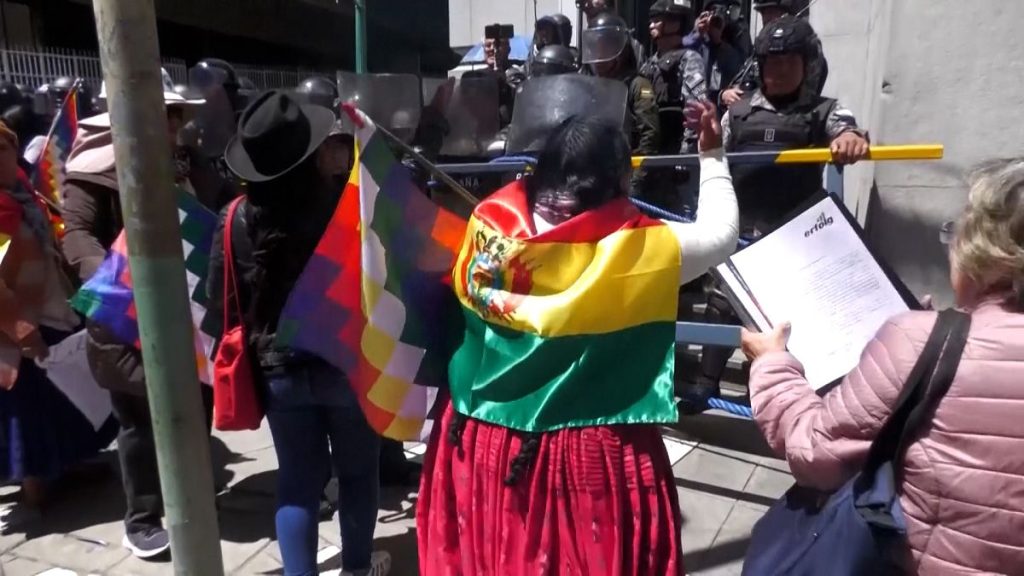The escalating political tension in Bolivia between former President Evo Morales and his successor, President Luis Arce, reached a new boiling point as Morales’ supporters embarked on a 100-kilometer march to La Paz, the nation’s capital. This demonstration, a show of force and solidarity with the former leader, coincided with a court hearing where Morales faced accusations of sexual abuse, specifically allegations of fathering a child with a minor. The timing of the march, just a day before the hearing, underscored the perceived connection between the legal proceedings and the ongoing political struggle between the two prominent figures. The march itself became a focal point for the expression of grievances against the Arce government, with Morales’ supporters characterizing the accusations as a politically motivated attempt to tarnish his reputation and obstruct any potential future presidential ambitions.
The allegations against Morales, which involve a relationship with a 15-year-old girl that allegedly resulted in a child, carry significant legal ramifications. While the legal process unfolds, the political implications reverberate throughout Bolivia’s already volatile political landscape. Morales’ defense team has challenged the proceedings, claiming inadequate notification, further fueling the narrative of political persecution. This legal maneuver, while procedural, adds another layer of complexity to the already charged atmosphere surrounding the case. The accusations themselves strike at the heart of Morales’ legacy and threaten to undermine the support he still commands within certain segments of the Bolivian population. The protests surrounding the hearing amplify these concerns and transform the legal battle into a public spectacle with profound political consequences.
The march to La Paz, culminating in clashes with police, highlights the deep divisions within the ruling Movement for Socialism (MAS) party. Once united under Morales’ leadership, the party is now fractured, with Arce seemingly consolidating power and distancing himself from his former mentor. The accusations against Morales provide a convenient pretext for Arce to further marginalize his political rival and consolidate his own position. This internal power struggle has destabilized the political landscape, creating uncertainty about the future direction of the MAS and the country as a whole. The escalating tensions raise concerns about the potential for further unrest and the erosion of democratic institutions.
The use of tear gas by police to disperse Morales’ supporters seeking to enter the central plaza underscores the government’s resolve to maintain order and prevent the protests from escalating into uncontrollable unrest. The clashes themselves symbolize the widening rift between Morales and the Arce government, transforming what was once political maneuvering into a physical confrontation. The government’s response indicates a willingness to employ force to counter what it perceives as a direct challenge to its authority. This firm stance could further alienate Morales’ supporters and exacerbate existing tensions.
The accusation that Arce’s government orchestrated a plot to derail Morales’ potential presidential candidacy reflects the deep-seated mistrust between the two camps. Morales, having avoided arrest since September while residing in the Chapare region, a stronghold of his support, remains a powerful figure in Bolivian politics. His ability to mobilize supporters and challenge the current government, even from a position of relative isolation, demonstrates his enduring influence. The claim of a plot, whether substantiated or not, resonates with his followers and solidifies their perception of political persecution. This narrative further polarizes the political landscape and complicates any attempts at reconciliation or dialogue.
The unfolding events in Bolivia represent a critical juncture in the country’s political trajectory. The power struggle between Morales and Arce has far-reaching implications for the stability of the nation and the future of the MAS party. The accusations against Morales, regardless of their ultimate validity, have become deeply entangled with the political maneuvering within the MAS. This intertwining of legal proceedings and political conflict makes it challenging to discern the truth amidst the competing narratives and accusations. The potential for further unrest and the erosion of democratic institutions remains a significant concern, requiring careful observation and analysis as the situation continues to evolve. The future of Bolivia hangs in the balance as the power struggle between these two dominant figures plays out against a backdrop of social and political unrest.














